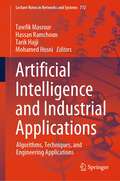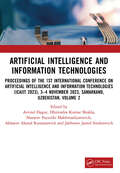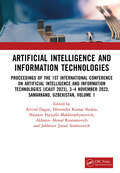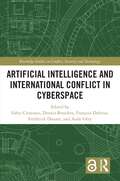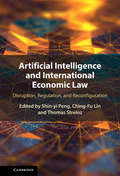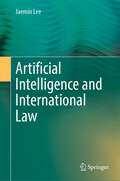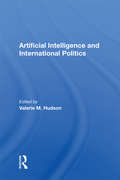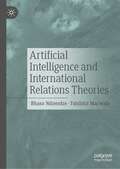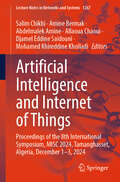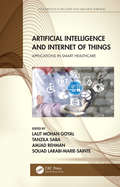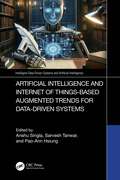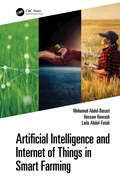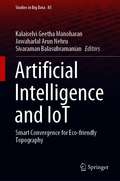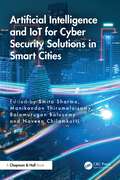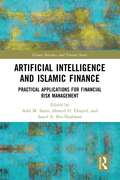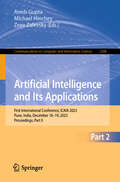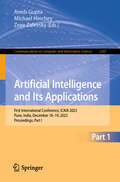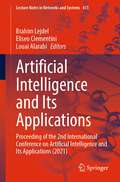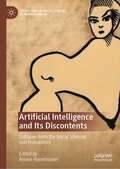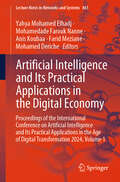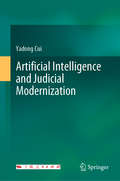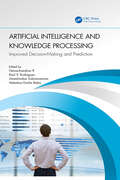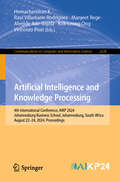- Table View
- List View
Artificial Intelligence and Industrial Applications: Algorithms, Techniques, and Engineering Applications (Lecture Notes in Networks and Systems #772)
by Tawfik Masrour Hassan Ramchoun Tarik Hajji Mohamed HosniAmid the dynamic growth of artificial intelligence, this book presents a collection of findings and advancements from the second edition of the A2IA-Artificial Intelligence and Industrial Applications conference. The conference, hosted by ENSAM-Meknès at Moulay Ismail University, Morocco, fosters knowledge exchange in AI, focusing primarily on its industrial applications. Covering a wide range of topics, the book highlights the adaptable nature of AI and its increasing impact on industrial sectors. It brings together contributions from an international cohort of researchers, discussing themes such as intelligent manufacturing and maintenance, intelligent supply chain management, various modes of learning including supervised, unsupervised, reinforcement, semi-supervised, and graph-based, as well as neural networks, deep learning, planning, and optimization. A defining feature of this edition is its extensive scope and emphasis on the practical applications of AI, along with its foundational elements. It facilitates an understanding of AI's current state and potential future direction, showcasing recent developments that bridge the gap between theory and practice. Designed for a diverse readership, this book is of interest to AI practitioners, academics, and enthusiasts, as well as to those new to the field. It provides an opportunity to explore AI's critical role in industrial applications, and the practical insights it offers are likely to be beneficial for decision-making within industrial settings.
Artificial Intelligence and Information Technologies: Proceedings of the 1st International Conference on Artificial Intelligence and Information Technologies (ICAIIT 2023), 3–4 November 2023, Samarkand, Uzbekistan, Volume 2
by Arvind Dagur Dhirendra Kumar Shukla Nazarov Fayzullo Makhmadiyarovich Akhatov Akmal Rustamovich Jabborov Jamol SindorovichThis book contains the proceedings of a non-profit conference with the objective of providing a platform for academicians, researchers, scholars and students from various institutions, universities and industries in India and abroad, and exchanging their research and innovative ideas in the field of Artificial Intelligence and Information Technologies.It begins with exploring the research and innovation in the field of Artificial Intelligence and Information Technologies including secure transaction, monitoring, real time assistance and security for advanced stage learners, researchers and academicians has been presented. It goes on to cover: Broad knowledge and research trends about artificial intelligence and Information Technologies and their role in today’s digital era. Depiction of system model and architecture for clear picture of AI in real life. Discussion on the role of Artificial Intelligence in various real-life problems such as banking, healthcare, navigation, communication, security, etc. Explanation of the challenges and opportunities in AI based Healthcare, education, banking, and related Industries. Recent Information technologies and challenges in this new epoch. This book will be beneficial to researchers, academicians, undergraduate students, postgraduate students, research scholars, professionals, technologists and entrepreneurs.
Artificial Intelligence and Information Technologies: Proceedings of the 1st International Conference on Artificial Intelligence and Information Technologies (ICAIIT 2023), 3–4 November 2023, Samarkand, Uzbekistan, Volume 1
by Arvind Dagur Dhirendra Kumar Shukla Nazarov Fayzullo Makhmadiyarovich Akhatov Akmal Rustamovich Jabborov Jamol SindorovichThis book contains the proceedings of a non-profit conference with the objective of providing a platform for academicians, researchers, scholars and students from various institutions, universities and industries in India and abroad, and exchanging their research and innovative ideas in the field of Artificial Intelligence and Information Technologies.It begins with exploring the research and innovation in the field of Artificial Intelligence and Information Technologies including secure transaction, monitoring, real time assistance and security for advanced stage learners, researchers and academicians has been presented. It goes on to cover: Broad knowledge and research trends about artificial intelligence and Information Technologies and their role in today’s digital era. Depiction of system model and architecture for clear picture of AI in real life. Discussion on the role of Artificial Intelligence in various real-life problems such as banking, healthcare, navigation, communication, security, etc. Explanation of the challenges and opportunities in AI based Healthcare, education, banking, and related Industries. Recent Information technologies and challenges in this new epoch. This book will be beneficial to researchers, academicians, undergraduate students, postgraduate students, research scholars, professionals, technologists and entrepreneurs.
Artificial Intelligence and International Conflict in Cyberspace (Routledge Studies in Conflict, Security and Technology)
by Fabio Cristiano Dennis Broeders François Delerue Frédérick Douzet Aude GéryThis edited volume explores how artificial intelligence (AI) is transforming international conflict in cyberspace. Over the past three decades, cyberspace developed into a crucial frontier and issue of international conflict. However, scholarly work on the relationship between AI and conflict in cyberspace has been produced along somewhat rigid disciplinary boundaries and an even more rigid sociotechnical divide – wherein technical and social scholarship are seldomly brought into a conversation. This is the first volume to address these themes through a comprehensive and cross-disciplinary approach. With the intent of exploring the question ‘what is at stake with the use of automation in international conflict in cyberspace through AI?’, the chapters in the volume focus on three broad themes, namely: (1) technical and operational, (2) strategic and geopolitical, and (3) normative and legal. These also constitute the three parts in which the chapters of this volume are organised, although these thematic sections should not be considered as an analytical or a disciplinary demarcation. This book will be of much interest to students of cyber-conflict, artificial intelligence, security studies and International Relations.
Artificial Intelligence and International Economic Law: Disruption, Regulation, and Reconfiguration
by Ching-Fu Lin Thomas Streinz N-Yi Peng Shi<p>Artificial intelligence (AI) technologies are transforming economies, societies, and geopolitics. Enabled by the exponential increase of data that is collected, transmitted, and processed transnationally, these changes have important implications for international economic law (IEL). This volume examines the dynamic interplay between AI and IEL by addressing an array of critical new questions, including: How to conceptualize, categorize, and analyze AI for purposes of IEL? How is AI affecting established concepts and rubrics of IEL? Is there a need to reconfigure IEL, and if so, how? Contributors also respond to other cross-cutting issues, including digital inequality, data protection, algorithms and ethics, the regulation of AI-use cases (autonomous vehicles), and systemic shifts in e-commerce (digital trade) and industrial production (fourth industrial revolution). This title is also available as Open Access on Cambridge Core.</p>
Artificial Intelligence and International Law
by Jaemin LeeThis book examines the timely issue of artificial intelligence (AI) and law. At this moment, AI is rapidly developing and being utilized in many different sectors. Meanwhile, the rise of AI raises complex questions and poses new challenges—new products and services involving AI will require new regulations and standards to minimize potential negative side-effects and maximize the benefits of this new technology, both within domestic law and international law. Thus, this book focuses on the impact of AI on international law and seeks ways to develop international law frameworks to adequately address the challenges of the AI era. In this context, new forms of inter-state conflicts and emergence of new subjects and objects of international law are discussed along with relevant up-to-date developments in major jurisdictions. Issues arising from the advent of AI relating to state sovereignty, state responsibility, dispute settlements, and north-south divide are also considered.
Artificial Intelligence And International Politics
by Valerie M HudsonFor well over a decade researchers in international relations have sought ways to combine the rigor of quantitative techniques with the richness of qualitative data. Many have discovered that artificial intelligence computer models allow them to do just that. Computer programs modeling international interactions and foreign policy decision making attempt to reflect such human characteristics as learning, memory, and adaptation. In this volume of original essays, distinguished scholars present a comprehensive overview of their research and reflect on the potential of artificial intelligence as a tool for furthering our understanding of international affairs. The contributors take a broad look at the early stirrings of interest in artificial intelligence as a potentially useful method of political analysis, exploring such topics as intentionality, time sense, and knowledge representation. The work also focuses on the current state of artificial intelligence and examines its general areas of emphasis: international interaction, decision making groups, and cognitive processes in international politics. The contributors represent a cross section of different approaches to using artificial intelligence and reflect the major research programs across the country in this new international relations subfield
Artificial Intelligence and International Relations Theories
by Bhaso Ndzendze Tshilidzi MarwalaThis book discusses the impact of artificial intelligence (AI) on international relations theories. As a phenomenon, AI is everywhere in the real world and growing. Through its transformative nature, it is simultaneously simplifying and complicating processes. Importantly, it also overlooks and “misunderstands”. Globally, leaders, diplomats and policymakers have had to familiarise themselves and grapple with concepts such as algorithms, automation, machine learning, and neural networks. These and other features of modern AI are redefining our world, and with it, the long-held assumptions scholars of IR have relied on for their theoretical accounts of our universe. The book takes a historic, contemporary and long-term approach to explain and anticipate AI’s impact on IR – and vice versa – through a systematic treatment of 9 theoretical paradigms and schools of thought including realism, liberalism, feminism, postcolonial theory and green theory. This book draws on original datasets, innovative empirical case studies and in-depth engagement with the core claims of the traditional and critical theoretical lenses to reignite debates on the nature and patterns of power, ethics, conflict, and systems among states and non-state actors.
Artificial Intelligence and Internet of Things: Proceedings of the 8th International Symposium, MISC 2024, Tamanghasset, Algeria, December 1-3, 2024 (Lecture Notes in Networks and Systems #1267)
by Salim Chikhi Amine Bermak Abdelmalek Amine Allaoua Chaoui Djamel Eddine Saidouni Mohamed Khireddine KholladiThis book offers a cutting-edge exploration of key advancements in artificial intelligence, IoT, data science, and their transformative impact on industries, particularly health care, in a rapidly evolving technological landscape. Readers will discover how AI and machine learning drive innovations, from detecting anomalies in satellite systems to enhancing medical diagnostics and treatment precision. With a focus on real-world applications, the book delves into the integration of IoT systems and cloud computing to streamline business operations and improve efficiency. It also introduces groundbreaking data science techniques for analysis and prediction, making it a valuable resource for professionals, researchers, and students. Designed for those looking to understand and harness the power of modern technology, this book provides insights that are both practical and forward-looking, equipping readers to address today’s challenges and shape the future.
Artificial Intelligence and Internet of Things: Applications in Smart Healthcare (Innovations in Big Data and Machine Learning)
by Lalit Mohan GoyalThis book reveals the applications of AI and IoT in smart healthcare and medical systems. It provides core principles, algorithms, protocols, emerging trends, security problems, and the latest e-healthcare services findings.The book also provides case studies and discusses how AI and IoT applications such as wireless devices, sensors, and deep learning could play a major role in assisting patients, doctors, and pharmaceutical staff. It focuses on how to use AI and IoT to keep patients safe and healthy and, at the same time, empower physicians to deliver superlative care.This book is written for researchers and practitioners working in the information technology, computer science, and medical equipment manufacturing industry for products and services having basic- and high-level AI and IoT applications. The book is also a useful guide for academic researchers and students.
Artificial Intelligence and Internet of Things based Augmented Trends for Data Driven Systems (Intelligent Data-Driven Systems and Artificial Intelligence)
by Pao-Ann Hsiung Sarvesh Tanwar Anshu SinglaThis book comprehensively discusses the role of cloud computing in artificial intelligence‑based data‑driven systems and hybrid cloud computing for large data‑driven applications. It further explores new approaches, paradigms, and frameworks to meet societal challenges by providing solutions for critical insights into data. The text provides Internet of Things‑based frameworks and advanced computing techniques to deal with online/virtual systems.This book:• Covers the aspects of security, authentication, and prediction for data‑driven systems in heterogeneous environments.• Provides data‑driven frameworks in combination with the Internet of Things, artificial intelligence, and computing to provide critical insights and decision‑making for real‑time problems.• Showcases deep learning‑based computer vision algorithms for enhanced pattern detection in different domains based on data‑centric approaches.• Examines the role of the Internet of Things and machine learning algorithms for data‑driven systems.• Highlights the applications of data‑driven systems and cloud computing in enhancing network performance.This book is primarily written for senior undergraduates, graduate students, and academic researchers in diverse fields including electrical engineering, electronics and communications engineering, and computer science engineering.
Artificial Intelligence and Internet of Things in Smart Farming
by Mohamed Abdel-Basset Hossam Hawash Laila Abdel-FatahThis book provides a broad overview of the areas of artificial intelligence (AI) that can be used for smart farming applications, through either successful engineering or ground-breaking research. Among them, the highlighted tactics are soil management, water management, crop management, livestock management, harvesting, and the integration of Internet of Things (IoT) in smart farming.Artificial Intelligence and Internet of Things in Smart Farming explores different types of smart framing systems for achieving sustainability goals in the real environment. The authors discuss the benefits of smart harvesting systems over traditional harvesting methods, including decreased labor requirements, increased crop yields, increased probabilities of successful harvests, enhanced visibility into crop health, and lower overall harvest and production costs. It explains and describes big data in terms of its potential five dimensions—volume, velocity, variety, veracity, and valuation—within the framework of smart farming. The authors also discuss the recent IoT technologies, such as fifth-generation networks, blockchain, and digital twining, to improve the sustainability and productivity of smart farming systems. The book identifies numerous issues that call for conceptual innovation and has the potential to progress machine learning (ML), resulting in significant impacts. As an illustration, the authors point out how smart farming offers an intriguing field for interpretable ML. The book then delves into the function of AI techniques, such as AI in accelerating the development of nano-enabled agriculture, thereby facilitating safe-by-design nanomaterials for various consumer products and medical applications.This book is for undergraduate students, graduate students, researchers, and AI engineers who pursue a strong understanding of the practical methods of machine learning in the agriculture domain. Practitioners and stakeholders would be able to follow this book to understand the potential of ML in their farming projects and agricultural solutions.Features:• Explores different types of smart framing systems for achieving sustainability goals in the real environment • Explores ML-based analytics such as generative adversarial networks (GAN), autoencoders, computational imaging, and quantum computing • Examines the development of intelligent machines to provide solutions to real-world problems, emphasizing smart farming applications, which are not modeled or are extremely difficult to model mathematically • Emphasizes methods for better managing crops, soils, water, and livestock, urging investors and businesspeople to occupy the existing vacant market area • Discusses AI-empowered Nanotechnology for smart farming
Artificial Intelligence and IoT: Smart Convergence for Eco-friendly Topography (Studies in Big Data #85)
by Kalaiselvi Geetha Manoharan Jawaharlal Arun Nehru Sivaraman BalasubramanianThis book projects a futuristic scenario that is more existent than they have been at any time earlier. To be conscious of the bursting prospective of IoT, it has to be amalgamated with AI technologies. Predictive and advanced analysis can be made based on the data collected, discovered and analyzed. To achieve all these compatibility, complexity, legal and ethical issues arise due to automation of connected components and gadgets of widespread companies across the globe. While these are a few examples of issues, the authors’ intention in editing this book is to offer concepts of integrating AI with IoT in a precise and clear manner to the research community. In editing this book, the authors’ attempt is to provide novel advances and applications to address the challenge of continually discovering patterns for IoT by covering various aspects of implementing AI techniques to make IoT solutions smarter. The only way to remain pace with this data generated by the IoT and acquire the concealed acquaintance it encloses is to employ AI as the eventual catalyst for IoT. IoT together with AI is more than an inclination or existence; it will develop into a paradigm. It helps those researchers who have an interest in this field to keep insight into different concepts and their importance for applications in real life. This has been done to make the edited book more flexible and to stimulate further interest in topics. All these motivated the authors toward integrating AI in achieving smarter IoT. The authors believe that their effort can make this collection interesting and highly attract the student pursuing pre-research, research and even master in multidisciplinary domain.
Artificial Intelligence and IoT for Cyber Security Solutions in Smart Cities
by Smita Sharma Manikandan Thirumalaisamy Balamurugan Balusamy Naveen ChilamkurtiThis book offers a comprehensive overview of the current state of cybersecurity in smart cities and explores how AI and IoT technologies can be used to address cybersecurity challenges. It discusses the potential of AI for threat detection, risk assessment, and incident response, as well as the use of IoT sensors for real-time monitoring and data analysis in the context of smart cities. It includes case studies from around the world to provide practical insights into the use of AI and IoT technologies for enhancing cybersecurity in different contexts and highlight the potential benefits of these technologies for improving the resilience and security of smart cities.Key Features: Studies the challenges of and offers relevant solutions to using AI and IoT technologies in cybersecurity in smart cities Examines the unique security risks faced by smart cities, including threats to critical infrastructure, data privacy and security, and the potential for large-scale cyber-attacks Offers practical solutions and case studies to be used to inform policy and practice in this rapidly evolving field Discusses the Fourth Industrial Revolution framework and how smart cities have been a significant part of this manufacturing paradigm Reviews aspects of Society 5.0 based on intelligent smart cities and sustainable issues for the cities of the future Postgraduate students and researchers in the departments of Computer Science, working in the areas of IoT and Smart Cities will find this book useful.
Artificial Intelligence and Islamic Finance: Practical Applications for Financial Risk Management (Islamic Business and Finance Series)
by Adel M. SareaThis book provides a systematic overview of the current trends in research relating to the use of artificial intelligence in Islamic financial institutions (IFIs), across all organization of Islamic cooperation (OIC) countries. Artificial Intelligence and Islamic Finance discusses current and potential applications of artificial intelligence (AI) for risk management in Islamic finance. It covers various techniques of risk management, encompassing asset and liability management risk, credit, market, operational, liquidity risk, as well as regulatory and Shariah risk compliance within the financial industry. The authors highlight AI’s ability to combat financial crime such as monitoring trader recklessness, anti-fraud and anti-money laundering, and assert that the capacity of machine learning (ML) to examine large amounts of data allows for greater granular and profound analyses across a variety of Islamic financial products and services. The book concludes with practical limitations around data management policies, transparency, and lack of necessary skill sets within financial institutions. By adopting new methodological approaches steeped in an Islamic economic framework (e.g., analysing FinTech in the context of Shariah principles and Islamic values), it devises practical solutions and generates insightful knowledge, helping readers to understand and explore the role of technological enablers in the Islamic finance industry, such as RegTech and artificial intelligence, in providing better and Shariah-compliant services to customers through digital platforms. The book will attract a wide readership spanning Shariah scholars, academicians, and researchers as well as Islamic financial practitioners and policymakers.
Artificial Intelligence and Its Applications: First International Conference, ICAIA 2023, Pune, India, December 18-19, 2023, Proceedings, Part II (Communications in Computer and Information Science #2308)
by Anish Gupta Michael Hinchey Zeev ZalevskyThis book constitutes the refereed proceedings of the First International Conference on Artificial Intelligence and its Application, ICAIA 2023, held in Pune, India, during December 18–19, 2023. The 37 full papers and 3 short papers presented in these two volumes were carefully reviewed and selected from 217 submissions. The conference focused on three primary domains: Use of AI in Health Care; Machine Vision and Image Processing; Automated and Digital Manufacturing Systems.
Artificial Intelligence and Its Applications: First International Conference, ICAIA 2023, Pune, India, December 18-19, 2023, Proceedings, Part I (Communications in Computer and Information Science #2307)
by Anish Gupta Michael Hinchey Zeev ZalevskyThis book constitutes the refereed proceedings of the First International Conference on Artificial Intelligence and its Applications, ICAIA 2023, held in Pune, India, during December 18–19, 2023. The 37 full papers and 3 short papers presented in these two volumes were carefully reviewed and selected from 217 submissions. The conference focused on three primary domains: Use of AI in Health Care; Machine Vision and Image Processing; Automated and Digital Manufacturing Systems.
Artificial Intelligence and Its Applications: Proceeding of the 2nd International Conference on Artificial Intelligence and Its Applications (2021) (Lecture Notes in Networks and Systems #413)
by Brahim Lejdel Eliseo Clementini Louai AlarabiThis book contains the proceedings of the second edition of the international Conference on Artificial Intelligence and its Applications (AIAP'21). This edition aims to bring together leading academic scientists, international researchers, and practitioners to exchange and share their experiences and research results on all aspects of Artificial Intelligence. It also provides an interdisciplinary platform for researchers, practitioners and students to present and discuss the most recent innovations, trends, and concerns as well as practical challenges encountered and solutions adopted in the fields of Artificial Intelligence. This international conference offers an opportunity to bridge the gap between the Artificial Intelligence research community and people from the industry or working in other research areas including smart cities, big data, cloud computing, social networks, and energy.
Artificial Intelligence and Its Contexts: Security, Business and Governance (Advanced Sciences and Technologies for Security Applications)
by Anna Visvizi Marek BodzianyThis book offers a comprehensive approach to the question of how artificial intelligence (AI) impacts politics, economy, and the society today. In this view, it is quintessential for understanding the complex nature of AI and its role in today’s world. The book has been divided into three parts. Part one is devoted to the question of how AI will be used for security and defense purposes, including combat in war zones. Part two looks at the value added of AI and machine learning for decision-making in the fields of politics and business. Part three consists of case studies—covering the EU, the USA, Saudi Arabia, Portugal, and Poland—that discuss how AI is being used in the realms of politics, security and defense. The discussion in the book opens with the question of the nature of AI, as well as of ethics and the use of AI in combat. Subsequently, the argument covers issues as diverse as the militarization of AI, the use of AI in strategic studies and military strategy design. These topics are followed by an insight into AI and strategic communication (StratCom), including disinformation, as well as into AI and finance. The case-studies included in part 3 of the book offer a captivating overview of how AI is being employed to stimulate growth and development, to promote data- and evidence-driven policy-making, to enable efficient and inclusive digital transformation and other related issues. Written by academics and practitioners in an academically sound, yet approachable manner, this volume queries issues and topics that form the thrust of processes that transform world politics, economics and society. As such, this volume will serve as the primer for students, researchers, lectures and other professionals who seek to understand and engage with the variety of issues AI implicates.
Artificial Intelligence and Its Discontents: Critiques from the Social Sciences and Humanities (Social and Cultural Studies of Robots and AI)
by Ariane HanemaayerOn what basis can we challenge Artificial Intelligence (AI) - its infusion, investment, and implementation across the globe? This book answers this question by drawing on a range of critical approaches from the social sciences and humanities, including posthumanism, ethics and human values, surveillance studies, Black feminism, and other strategies for social and political resistance. The authors analyse timely topics, including bias and language processing, responsibility and machine learning, COVID-19 and AI in health technologies, bio-AI and nanotechnology, digital ethics, AI and the gig economy, representations of AI in literature and culture, and many more. This book is for those who are currently working in the field of AI critique and disruption as well as in AI development and programming. It is also for those who want to learn more about how to doubt, question, challenge, reject, reform and otherwise reprise AI as it been practiced and promoted.
Artificial Intelligence and Its Practical Applications in the Digital Economy: Proceedings of the International Conference on Artificial Intelligence and Its Practical Applications in the Age of Digital Transformation 2024, Volume 1 (Lecture Notes in Networks and Systems #861)
by Yahya Mohamed Elhadj Mohamedade Farouk Nanne Anis Koubaa Farid Meziane Mohamed DericheArtificial Intelligence (AI) technologies hold immense promise for developing countries by offering innovative solutions to longstanding challenges. By leveraging AI in health care, education, economic development, infrastructure, and resource management, these countries can potentially leapfrog traditional development stages and improve the quality of life for their populations. However, it's essential to approach AI deployment with ethical considerations to ensure that the technology serves the best interests of these communities and thus to maximize the expected benefits. The I2COMSAPP'24 "International Conference on Artificial Intelligence and its Applications in the Age of Digital Transformation" aims to provide an excellent opportunity to gather experts, researchers, practitioners, and innovators from various fields to explore the latest advancements, challenges, and practical implementations of artificial intelligence and machine learning (ML) technologies. Moreover, it aims to foster knowledge sharing, collaboration, and networking among professionals who are driving responsible and innovative use of AI and leveraging real-world applications for the betterment of society and industries.
Artificial Intelligence and Its Practical Applications in the Digital Economy: Proceedings of the International Conference on Artificial Intelligence and its Practical Applications in the Age of Digital Transformation 2024, Volume 2 (Lecture Notes in Networks and Systems #862)
by Yahya Mohamed Elhadj Mohamedade Farouk Nanne Anis Koubaa Farid Meziane Mohamed DericheArtificial Intelligence (AI) technologies hold immense promise for developing countries by offering innovative solutions to longstanding challenges. By leveraging AI in health care, education, economic development, infrastructure, and resource management, these countries can potentially leapfrog traditional development stages and improve the quality of life for their populations. However, it's essential to approach AI deployment with ethical considerations to ensure that the technology serves the best interests of these communities and thus to maximize the expected benefits. The I2COMSAPP'24 "International Conference on Artificial Intelligence and its Applications in the Age of Digital Transformation" aims to provide an excellent opportunity to gather experts, researchers, practitioners, and innovators from various fields to explore the latest advancements, challenges, and practical implementations of artificial intelligence and machine learning (ML) technologies. Moreover, it aims to foster knowledge sharing, collaboration, and networking among professionals who are driving responsible and innovative use of AI and leveraging real-world applications for the betterment of society and industries.
Artificial Intelligence and Judicial Modernization
by Yadong CuiThis book comprehensively describes the status quo of artificial intelligence technology applications in the judicial field in China. Written by Cui Yadong, the former President of Shanghai Senior People's Court, it is divided into three parts: the first part focuses mainly on the theoretical issues related to artificial intelligence and judicial applications. The second part highlights practical aspects, discussing the research and development process, the implementation of the"206 system" and the major breakthroughs. The third part then addresses lessons learned and the thinking, particularly the thinking on "building the future rule of law of artificial intelligence", a new topic that responds to people's concerns about the risks and challenges of the development of artificial intelligence. In this context, the book argues that the judicial task is twofold: On the one hand, it should actively promote the integration and application of AI in the judiciary, judicial intelligence, and judicial modernization. On the other hand, it should encourage the construction of a future rule of law system of artificial intelligence, highlight the role of the judiciary in dealing with future risks and challenges, bring the development of artificial intelligence into line with the rule of law, and use the rule of law to promote, standardize and guarantee the safe, reliable and controllable development of artificial intelligence.
Artificial Intelligence and Knowledge Processing: Improved Decision-Making and Prediction
by Hemachandran K Raul V. Rodriguez Umashankar Subramaniam Valentina Emilia BalasArtificial Intelligence and Knowledge Processing play a vital role in various automation industries and their functioning in converting traditional industries to AI-based factories. This book acts as a guide and blends the basics of Artificial Intelligence in various domains, which include Machine Learning, Deep Learning, Artificial Neural Networks, and Expert Systems, and extends their application in all sectors. Artificial Intelligence and Knowledge Processing: Improved Decision-Making and Prediction, discusses the designing of new AI algorithms used to convert general applications to AI-based applications. It highlights different Machine Learning and Deep Learning models for various applications used in healthcare and wellness, agriculture, and automobiles. The book offers an overview of the rapidly growing and developing field of AI applications, along with Knowledge of Engineering, and Business Analytics. Real-time case studies are included across several different fields such as Image Processing, Text Mining, Healthcare, Finance, Digital Marketing, and HR Analytics. The book also introduces a statistical background and probabilistic framework to enhance the understanding of continuous distributions. Topics such as Ensemble Models, Deep Learning Models, Artificial Neural Networks, Expert Systems, and Decision-Based Systems round out the offerings of this book. This multi-contributed book is a valuable source for researchers, academics, technologists, industrialists, practitioners, and all those who wish to explore the applications of AI, Knowledge Processing, Deep Learning, and Machine Learning.
Artificial Intelligence and Knowledge Processing: 4th International Conference, AIKP 2024, Johannesburg Business School, Johannesburg, South Africa, August 22–24, 2024, Proceedings (Communications in Computer and Information Science #2228)
by Hemachandran K. Raul Villamarin Rodriguez Manjeet Rege Abejide Ade-Ibijola Kok-Leong Ong Vincenzo PiuriThis book constitutes the 4th International Conference on Artificial Intelligence and Knowledge Processing, AIKP 2024, held in Johannesburg Business School, Johannesburg, South Africa, during August 22–24, 2024. The 18 full papers included in this book were carefully reviewed and selected from 76 submissions. This AIKP 2024 topics covered in these proceedings; including machine learning; natural language processing; computer vision; robotics; data mining; quantum AI; and cognitive computing.
